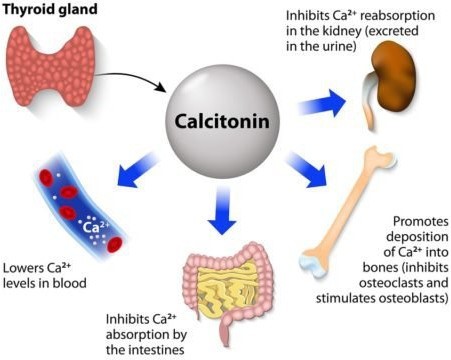The hormone that stimulates calcium deposition into bone is:
Calcitonin.
Parathyroid hormone.
Thyroxine.
Insulin.
The Correct Answer is A

Calcitonin is a hormone that protects against excessive blood calcium levels by inhibiting bone turnover and decreasing reabsorption.
It is produced by the thyroid gland and acts on both osteoclasts and osteoblasts.
Choice B is wrong because parathyroid hormone (PTH) stimulates both resorption and formation of bone, and controls the level of calcium in the blood.
Choice C is wrong because thyroxine is a thyroid hormone that is required for skeletal maturation and influences adult bone maintenance but does not directly affect calcium deposition into bone.
Choice D is wrong because insulin is a hormone that regulates both bone formation and bone resorption but does not specifically stimulate calcium deposition into bone.
Nursing Test Bank
Naxlex Comprehensive Predictor Exams
Related Questions
Correct Answer is A
Explanation
This is because ventricular systole is the phase of the cardiac cycle when the ventricles contract and pump blood into the arteries.
The blood pressure in the arteries is greatest during this phase because of the forceful ejection of blood.
Choice B.
Atrial diastole is wrong because atrial diastole is the phase of the cardiac cycle when the atria relax and fill with blood from the veins.
The blood pressure in the arteries is lowest during this phase because the ventricles are also relaxed and not pumping blood.
Choice C.
Ventricular diastole is wrong because ventricular diastole is the phase of the cardiac cycle when the ventricles relax and fill with blood from the atria.
The blood pressure in the arteries is low during this phase because the ventricles are not pumping blood.
Choice D.
Atrial systole is wrong because atrial systole is the phase of the cardiac cycle when the atria contract and push blood into the ventricles.
The blood pressure in the arteries is not affected by this phase because the ventricles are still relaxed and not pumping blood.
The normal range for systolic blood pressure is less than 120 mm Hg and for diastolic blood pressure is less than 80 mm Hg.
Correct Answer is C
Explanation
The conversion of fibrinogen to fibrin by thrombin is the final step in the formation of a blood clot.
Fibrin is a protein that forms a net-like structure that traps platelets and other blood cells, making the clot stronger and more durable.
Choice A is wrong because the formation of a prothrombin activator is the first step in the formation of a blood clot.
A prothrombin activator is a complex of enzymes that converts prothrombin to thrombin.
Choice B is wrong because the conversion of prothrombin to thrombin by the prothrombin activator is the second step in the formation of a blood clot.
Thrombin is an enzyme that converts fibrinogen to fibrin.
Choice D is wrong because tissue damage is not a step in the formation of a blood clot, but a trigger for the clotting process.
When blood vessels are injured, they release substances that activate platelets and clotting factors.
Whether you are a student looking to ace your exams or a practicing nurse seeking to enhance your expertise , our nursing education contents will empower you with the confidence and competence to make a difference in the lives of patients and become a respected leader in the healthcare field.
Visit Naxlex, invest in your future and unlock endless possibilities with our unparalleled nursing education contents today
Report Wrong Answer on the Current Question
Do you disagree with the answer? If yes, what is your expected answer? Explain.
Kindly be descriptive with the issue you are facing.
